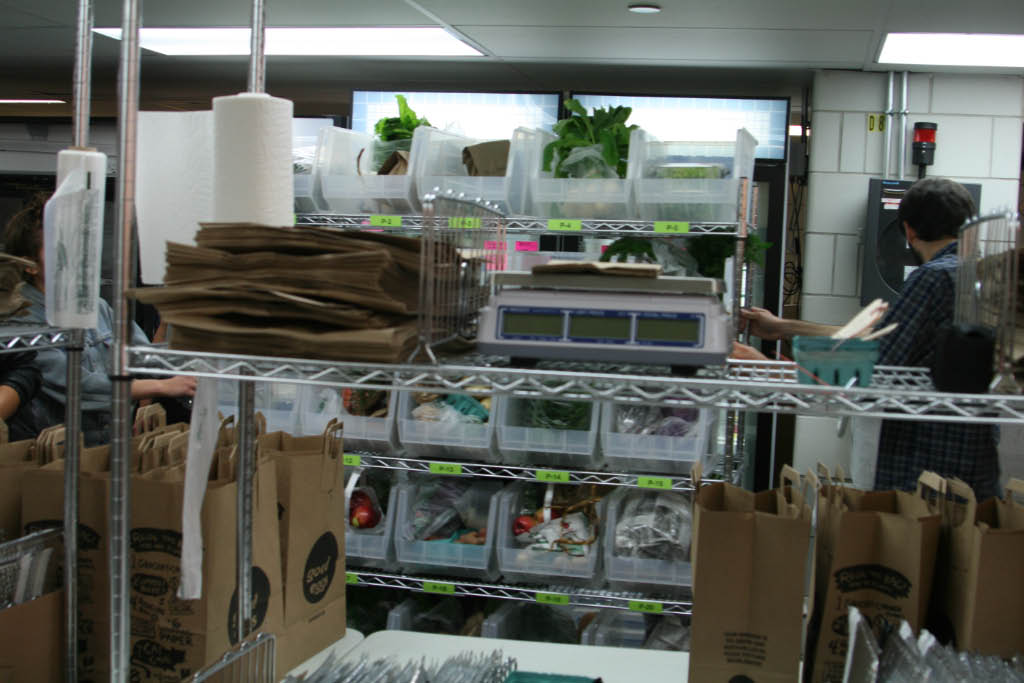Local food oriented food delivery service Good Eggs delivers borough-wide as of today.
They have also expanded their pickup locations around the borough, so customers can save the $3.99 delivery charge if they have time to swing by one of the pickup sites. We visited the Brooklyn HQ of the San Francisco based company on Friday, and were surprised at how deeply tech culture shapes every facet of what seem like, from the outside, a classic ecommerce company.

The Good Eggs team still considers themselves in startup mode. It’s searching for the best approach to selling, collecting, sorting and delivering local food out to its customers.
It’s a fairly complicated logistical process, and the company is using Agile management in multiple facets of the company.
“Because food distribution is so complex, it’s not really one management system,” Rob Spiro, the CEO told us.
Good Eggs has “a growing team of about two dozen” in Brooklyn and more than 100 nation-wide., said city lead Morgenthau.
Here are some ways that Agile informs the rapidly evolving company:
- They have software for the ecommerce site, producers and a series of tablet apps, one each for their receiving, packing and delivery teams. These software systems get multiple updates each day.
- “The way we have built our physical space is built on software innovation,” Rob Spiro told us. He explained, as one example, that they used to set up bins of deliveries and pull units from the bins to assemble orders. Now they unload deliveries straight into bins coded for customers orders.
- In order to insure on-time deliveries from producers, they are iterating an incentive system. Everything is iterating now as the company grows, Spiro told us: “There’s not some grand plan that we are executing on in a waterfall way.” Instead, they are engineering the process as they go.
- The goal is 100 percent “frictionless data flow” between platforms, Spiro told us.
We’ve highlighted other local startups with an emphasis on artisanal foods, like MOUTH and Blockful — that no doubt shows Brooklyn’s local passion, and brings up whether and how soon other parts of the country will care as much.
Despite the similar roots, those services might put themselves in different niches within the artisanal food market. First of all, Good Eggs has a local focus. More like a grocery store, it is serving customers in its own backyard.
Perhaps most notably, though, Good Eggs doesn’t have any inventory to speak of. Customers make orders approximately 32 hours in advance and producers prepare foods precisely for those orders. The deliveries come in and go out the same day.
On the back end, the system has been engineered for flexibility. So, for example, if a maker of blondies has told the company that it can handle 100 orders per day and Good Eggs hits its 100th order before the deadline comes up, the blondies just disappear from customers order screen for that day’s pick up. Or, for example, if 32 hours isn’t quite enough turnaround time for a given producer (say a breadmaker that needs to let her dough rise), the same thing happens.
The company provides a wide array of foods: from breads to sweets to yogurts and vegetables. In fact, its New York City Lead, Josh Morgenthau, is himself a farmer at Fishkill Farms, a produce grower a bit upstate. As you might guess, the food isn’t cheap: a pint of veggie chili will run you $7.50. It is really good, though.
Technically Brooklyn got to sit in on its Friday staff lunch and its Sunday launch party, both of which were rich local foods from the companies providers. It was all super fresh and very good.
Customers may also be interested to know that all producers get a personal meeting with company staff before joining the site. Staff makes sure each producer meets its standards for high integrity food production, the Good Eggs team says repeatedly.
The company is located in the old Pfizer Building in Bed-Stuy (the same building as Brooklyn Research). It’s turning into a bit of a local food hub. Several of their producers are located inside (such as Raw Apothecary, Brooklyn Kombucha and Littabit Sweets), which works out well for all of them. It raised $8.5 Million in a Series A led by Sequoia Capital which closed in September. The funding financed its expansion to Brooklyn, the first of what the company hopes will become many cities networked to eat locally.
The story of how the company went from a platform for CSAs and other producers to sell their food to a delivery system is detailed on Forbes.
Some photos from the Flushing Ave space:










